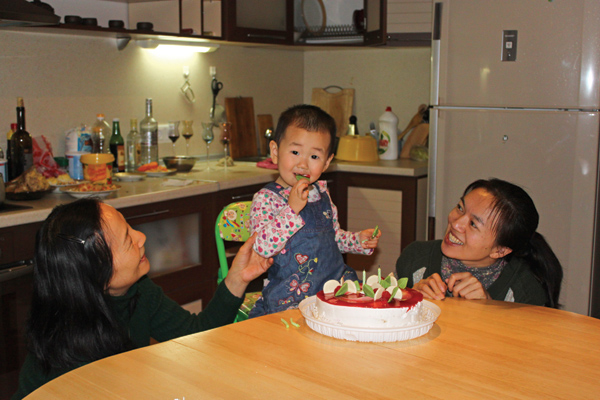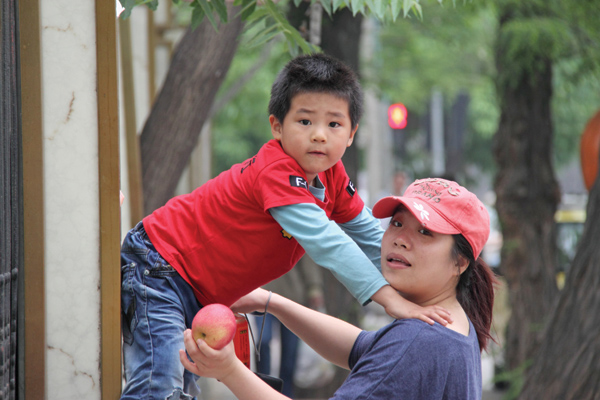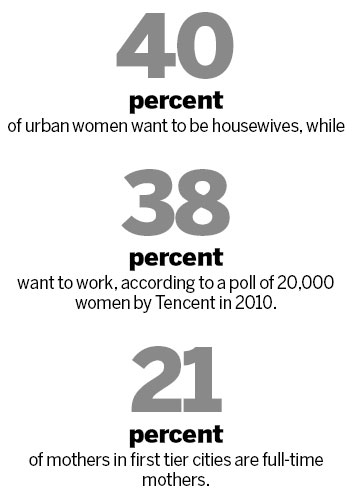Home sweet home?
 |
|
Feng Juan (right), her boy and a friend at her home in Beijing. Provided to China Daily |
 |
|
Stay-at-home mother Lin Li and her son at a Beijing park. Provided to China Daily |
 |
|
More women are choosing to quit their jobs after giving birth. Wang Biao / For China Daily |
Related: Man's brave new world
Women are increasingly deciding to give up work and becoming full-time homemakers or mothers, report Cheng Anqi in Beijing and Li Xinzhu in Shanghai.
An increasing number of urban women are choosing to be homemakers, rather than pursue careers.
About 40.09 percent said they wanted to be housewives, while 37.8 percent indicated they wanted to work, and the remainder expressed no preference, according to a poll of 20,000 women by Tencent in 2010.
Another survey, published in China Women's News in October 2011, suggests 21 percent of mothers in first tier cities were full-time mothers, while 87 percent of these full-time mothers had a college education and 6 percent had graduate degrees.
"I felt an increasing pressure to balance work and family after being diagnosed with acute myocarditis two years ago," says housewife Yang Di, who has a degree from a United States university.
The 29-year-old used to work at an investment bank, sometimes staying at the office until 3 am, adding she put on 15 kg over six years and became bad tempered, which she blames on overwork.
In 2009, she fainted while working and was diagnosed as having an inflammation of the heart muscle. Yang was found to have a brain tumor a year later and was persuaded to quit her job and recuperate at home.
"I sort of regret being a workaholic because it ruined my health."
When well-educated women climb the career ladder they suffer mounting pressure from their career, kids and marriage, which can make them seek an alternative or easier lifestyle, says Jiang Yongping, a researcher at the Women's Studies Institute of China under the All-China Women's Federation.
During China's planned economy period from the 1950s the government provided nurseries at almost every State-owned work unit to help working moms ease their burden, which created a stress-free environment.
Yang recalls when she was 2 years old she was sent to a nursery opened by her mom's unit.
"Even though she was on duty during weekends, she had a lot of spare time during office hours to dote on me and was not afraid of being fired," she says.
After the market economy became dominant in the 1990s, State-owned enterprises shut down their nurseries to reduce costs, which led to urban women opting to stay at home, Jiang explains.
A survey by the Women's Studies Institute in 2011 showed 99.9 percent of families across China take care of their own children aged under 3, and 60 percent of moms look after these kids all day long.
When children start kindergarten at 3 it is often the case that parents are late arriving for work or have to leave early to pick up their kids.
Liang Yuan, 27, is eight months pregnant and plans to quit her job after giving birth, as her salary in Shanghai as a media planner is about 4,000 yuan ($635), roughly the same as the cost of hiring a nanny.
"If we hire a skilled nanny, the price could be much higher," Liang says. "Also, I don't trust them as there is so much negative news about them."
Liang's husband is 12 years older than her and a deputy director of an investment company, whose annual salary achieved is about 1 million yuan ($158,599).
As such she does not have financial pressures, but is nevertheless concerned about being a stay-at-home mom.
"I am afraid of becoming isolated from society and my social networks," she says.
On the other hand, she adds, there are benefits to staying at home such as watching TV at home and making new friends.
Liang says her female friends are envious of her for not working, though her parents have a different opinion.
"I'm afraid Liang is too young to leave work and it will be very hard for her to start again," says Liang's mother Guo Yan. "I think she should be more independent and not totally rely on her husband."
"Many stay-at-home moms hate to see their life become a dead-end and want to be sociable and broaden their horizons after years of housework and baby rearing," Jiang says.
But many cannot find jobs again because they need professional skills training.
Jiang says Nordic countries are a good example as here dual income households are the norm and there is public childcare, parental leave and flexible working hours.
In Sweden, companies keep open new moms' jobs for two years after childbirth and provide professional skills training, supported by the local government.
Feng Juan, who graduated from Guangdong University of Foreign Studies eight years ago, worked in a minor support position at a telecom equipment company after marrying a diplomat and gradually scaled back her work when she was having a baby.
"My husband is sent to work abroad and I willingly accompany him, although I'm unemployed," says Feng, who takes care of her child and learns languages in her spare time. "Women make these sacrifices voluntarily. For me, a successful family life is worth struggling for more than a successful career."
"My husband earns three times more than I do, but I control the purse strings," she adds with a smile.
"Many professionals, like me, feel that it's not worth sacrificing their careers for their husbands, but if it is for your kids, that's different," says Beijing-based Ling Li, who has a master's degree from University of the Arts London and is now a stay-at-home mom.
Young mothers used to get their parents to look after their children when they went back to work.
"When I was born, my parent sent me to my grandparents' home until I was 8 years old," says Ling, who stayed at home to ensure a better education for her child.
"Being away from my parents during that time had a negative impact on my personality. I don't want my daughter to have the same experience.
"I have given up my career to give my child guidance. I hope I can make my child realize that success is not just a good paycheck."
Contact the writer at [email protected]























